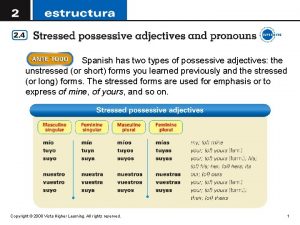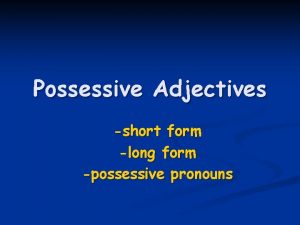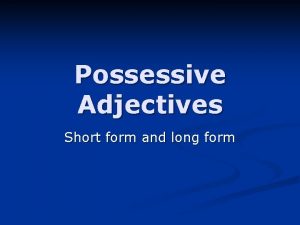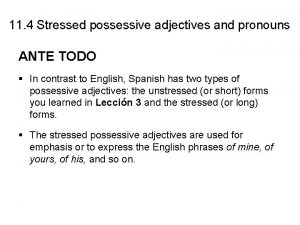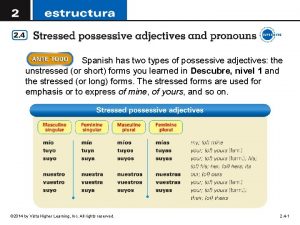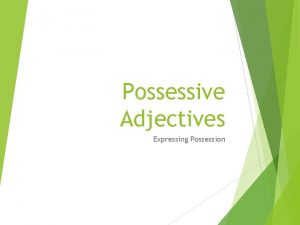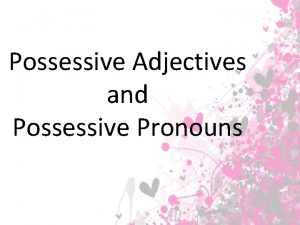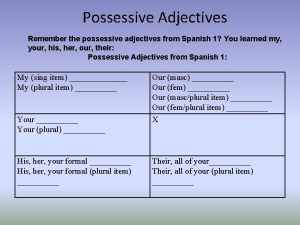Spanish has two types of possessive adjectives the





![Possessive pronouns u Possessive pronouns are used to replace a noun + [possessive adjective]. Possessive pronouns u Possessive pronouns are used to replace a noun + [possessive adjective].](https://slidetodoc.com/presentation_image/4eb9a05dedc02876b52e58061f6589eb/image-6.jpg)


- Slides: 8

Spanish has two types of possessive adjectives: the unstressed (or short) forms you learned previously and the stressed (or long) forms. The stressed forms are used for emphasis or to express of mine, of yours, and so on. u Copyright © 2008 Vista Higher Learning. All rights reserved. 1

u ¡Atención! Used with un/una, these possessives are similar in meaning to the English expression of mine/yours/etc. Copyright © 2008 Vista Higher Learning. All rights reserved. 2

u Stressed possessive adjectives agree in gender and number with the nouns they modify. Stressed possessive adjectives are placed after the noun they modify, while unstressed possessive adjectives are placed before the noun. Copyright © 2008 Vista Higher Learning. All rights reserved. 3

u. A definite article, an indefinite article, or a demonstrative adjective usually precedes a noun modified by a stressed possessive adjective. Copyright © 2008 Vista Higher Learning. All rights reserved. 4

u Since suyo, suya, suyos, and suyas have more than one meaning, you can avoid confusion by using the construction: [article] + [noun] + de + [subject pronoun]. Copyright © 2008 Vista Higher Learning. All rights reserved. 5
![Possessive pronouns u Possessive pronouns are used to replace a noun possessive adjective Possessive pronouns u Possessive pronouns are used to replace a noun + [possessive adjective].](https://slidetodoc.com/presentation_image/4eb9a05dedc02876b52e58061f6589eb/image-6.jpg)
Possessive pronouns u Possessive pronouns are used to replace a noun + [possessive adjective]. In Spanish, the possessive pronouns have the same forms as the stressed possessive adjectives, and they are preceded by a definite article. Copyright © 2008 Vista Higher Learning. All rights reserved. 6

u A possessive pronoun agrees in number and gender with the noun it replaces. Copyright © 2008 Vista Higher Learning. All rights reserved. 7

Indica las formas tónicas (stressed) de estos adjetivos posesivos y los pronombres posesivos correspondientes. adjetivos 1. 2. 3. 4. 5. 6. 7. 8. 9. la videocasetera suya su videocasetera ______ mi televisor ______ nuestros discos compactos ______ tus calculadoras ______ su monitor ______ mis videos ______ nuestra impresora ______ tu estéreo ______ nuestro cederrón ______ 10. mi computadora ______ pronombres la suya ____________ ____________ ____________ 8


